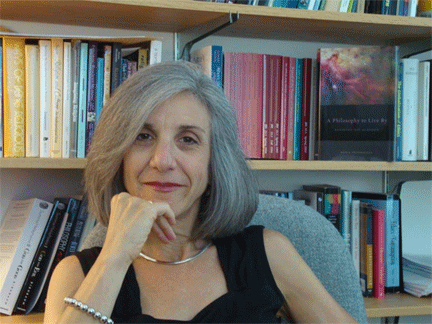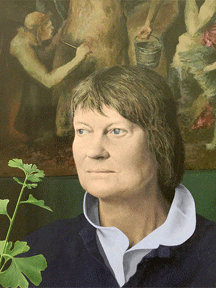By Jasna Rodulfa
With modernity’s lowering of the “metaphysical ceiling,” in Michael Fishbane’s words, religion, commonly attributed to belief in a supernatural being, may no longer be viable. As a result, many Westerners are becoming at odds with adhering to a particular religion, especially if its truth claims and the traditions in which they thrive may not take into account our contemporary situation. In a society skeptical of religion, one may be tempted to turn to more “credible” sources, such as philosophy or science, for some sort of direction or meaning in life. Yet for many of us, these sources are still unable to satiate or give an adequate direction or meaning, if at all.
Maria Antonaccio argues that Iris Murdoch “speaks to the position of those who linger at the threshold of religious (or at least theistic) belief, who either find themselves unwilling to commit themselves fully to a religious worldview or who have drawn back, disappointed or perhaps even damaged, from a previous religious commitment.”
In her new book, A Philosophy to Live By: Engaging Iris Murdoch (Oxford University Press, 2012), Antonaccio examines Murdoch’s “theology which can continue without God,” one that redefines religion not as a mode of belief in a supernatural being but, as Antonaccio quotes her, “a mode of belief in the unique sovereign place of goodness or virtue in human life.” For Antonaccio, it is not Murdoch’s agenda to disprove the existence of God, for she assumes that this is already a widespread assertion or preference of belief today. Nonetheless, in the realm of ethics, Murdoch sees the figure of God as an impediment, subject to what Immanuel Kant identified as the problematic heteronomous principle. Instead of a now-unreachable God, moral judgment is placed back in the power of the moral agent, that is, the human.
And yet Murdoch continued to value religion as a technique of human moral transformation. As she famously recognized, in the realm of ethics, “the greatest enemy is the fat, relentless ego.” She follows this assertion with techniques for overcoming egoism that range from contemplating on art and nature to engaging in prayer in order to train the human to become less clouded in his judgment and to become more oriented towards others and what she calls the transcendental Good. Antonaccio argues that these techniques and the mental framework in which they operate hark back to ancient ascetic models of philosophy but that they are nonetheless uniquely applicable to contemporary life. Murdoch’s is a “philosophy,” in the ancient sense, or a religion, in the contemporary sense, that a morally responsible and meaning-seeking citizen of the twenty-first century can actually “live by.” Antonaccio analyzes Murdoch’s philosophy in light of contemporary ethical and religious scholars, as well as in recognition of people’s hunger for a way of living “the good life” when religion, as it is widely conceived today, no longer seems to be a viable source, as much as it may (or may not) be desired.
Antonaccio is professor of religious ethics at Bucknell University. Her current research interests are in contemporary approaches to askesis, as well as issues regarding environmental ethics and the ethics of consumption.
She received her B.A. from Williams College in 1982, where she majored in religion and was inducted into Phi Beta Kappa. Today, years after her undergraduate studies at Williams and her graduate studies at the University of Chicago, she has continued to exemplify the ideals of Phi Beta Kappa as an internationally recognized scholar at a liberal arts university for her interdisciplinary research, with multiple articles and two books published, including A Philosophy to Live By and her first work, Picturing the Human: The Moral Thought of Iris Murdoch (Oxford University Press, 2000).
In the classroom, Antonaccio challenges her students to critically evaluate their ways of thought and living through engaging seminars and thought-stimulating writing assignments. She thrives on Bucknell’s promotion of interdisciplinary examination by offering courses on religion and global ethics, environmental ethics, bioethics, ancient and contemporary forms of asceticism, and so on, attracting students from various majors. In 2006, she received Bucknell’s Presidential Award for Teaching Excellence. As a recent graduate of Bucknell and former student of hers, I can affirm that her “teaching excellence” continues today.
Antonaccio’s devotion to her students extends beyond the classroom and towards her ties with her membership in Phi Beta Kappa. “As professors,” she says, “nominating students for Phi Beta Kappa is one of the highest achievements we bestow upon our undergraduates.” It is natural for Antonaccio to have a more personal commitment when evaluating which of her students possess the character and capabilities that characterize a member of the Society. “It is a privilege to be on the other side of the process and to have my students recognized for their intellectual achievements by being a part of this nationally renowned organization.”
Jasna Rodulfa is a new Phi Beta Kappa member from Bucknell University where she earned a bachelor’s degree in religion and East Asian studies. Bucknell is home to the Mu of Pennsylvania chapter of Phi Beta Kappa.

Top left: Portrait of Dame Iris Murdoch by Tom Phillips. Above: Maria Antonaccio.




